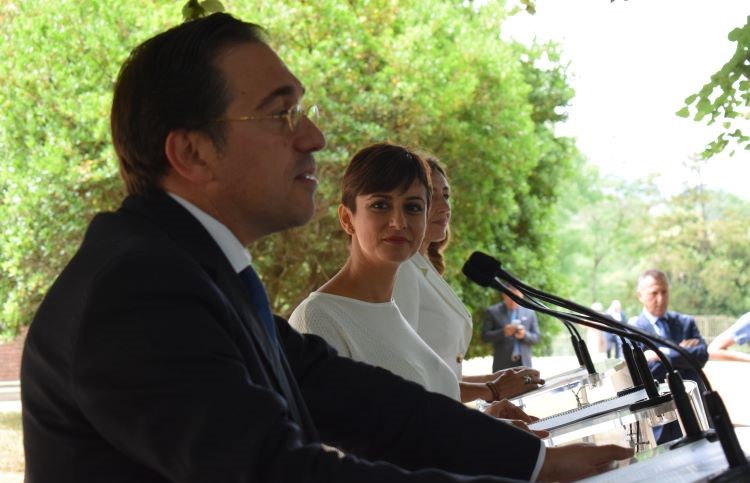Eduardo González
The Government yesterday specified the distribution of the venues that will host the main meetings of the Spanish Presidency of the Council of the EU, within the purpose of the Executive of Pedro Sánchez to “involve all the Autonomous Communities”.
The Minister of Foreign Affairs, José Manuel Albares, and the Minister of Territorial Policy and Government Spokesperson, Isabel Rodríguez, chaired yesterday in Leoia (Vizcaya) the Conference for Affairs Related to the European Union (CARUE), which was attended by representatives of all the Autonomous Communities to prepare the Spanish Presidency, to be held in the second half of 2023. CARUE, with more than 30 years of history, is the multilateral cooperation body through which the Communities intervene in European matters that affect them. The Conference first met in 1989. Yesterday’s meeting, the 65th, is the first to be held outside Madrid.
“Today in Leioa we are kicking off the Spanish Presidency of the European Union with the collaboration of the Autonomous Communities, because European foreign action is a State policy,” said Isabel Rodríguez at the press conference following the meeting. “This is the fifth time that Spain assumes the rotating presidency of the Council and for the first time measures are being adopted by the Government to ensure that all the Autonomous Communities have the opportunity to host a high-level event,” she added. For this reason, she announced, “it will be a territorialized European Presidency, since informal meetings will be held at ministerial level in 25 cities in all the Autonomous Communities”.
For his part, José Manuel Albares stated at the same press conference that the Spanish Presidency “is a country project” and, therefore, the Government’s aim is that, “as happened with the recent NATO summit, it will once again be a success for the country and for all Spaniards”, an objective on which “all the Autonomous Communities are in agreement”. Likewise, he assured that Spain will take advantage of the Presidency of the EU to promote the use of the co-official languages in the European Parliament. “Administrative agreements have been reached with practically all the administrations, except the European Parliament,” he explained. “There are already agreements with the Council, the Commission, the Court of Justice or the Ombudsman. Citizens can address all these institutions in co-official languages and can address answers to their queries in the same languages,” he added.
The venues
On July 6, the Organizing Committee of the Spanish Presidency of the European Union -a body attached to the Presidency of the Government that is responsible for the programming, planning, coordination and execution of the activities of the public administrations in this field and whose presidency is held by Minister Albares- approved a list of 25 cities to host the main meetings of the Spanish Presidency of the Council of the EU.
At the end of yesterday’s CARUE meeting, the dates and venues of the various ministerial meetings of the Spanish Presidency were announced, a Presidency that will get off to a strong start, with seven meetings at the highest level in its first month alone. The first city on the list is Vigo, which will host the informal ministerial meeting on Fisheries on July 3 and 4, 2023; the Galician city will be followed by Madrid, with the meeting on Labor and Social Policies (July 13 and 14); Valladolid, Environment and Energy (July 17, 18 and 19); Logroño, Justice and Home Affairs (July 20 and 21); Bilbao, Competitiveness (July 24 and 25); Santander, Research (July 27 and 28); and Las Palmas de Gran Canaria, Health (July 27 and 28).
One of the most politically interesting meetings will take place in Toledo, which will host the double informal ministerial meeting of Defense and Foreign Affairs on August 29, 30 and 31. More specifically, the informal Foreign Affairs meeting (Gymnich) will be held on August 29 and 30, coordinated by the Ministry headed by Albares, and the informal Defense meeting (CAE), coordinated by the Ministry of Defense, will take place on August 30 and 31.
Activity will resume in earnest in September. Cordoba will host the informal ministerial meeting on Agriculture on September 4 and 5; followed by Cadiz, Development Cooperation (September 4 and 5); Santiago de Compostela, Economy and Finance (September 15 and 16); Zaragoza, Education and Youth (September 19 and 20); Barcelona, Transport (September 21 and 22); Caceres, Culture and Sports (September 25 and 26); and Murcia, with the informal ministerial meeting of the General Affairs Council, on September 28 and 29.
Likewise, León will host the informal ministerial meeting on Telecommunications on October 10 and 11; Seville, the informal ministerial meeting on Space (October 16 and 17); Valencia, Trade (October 19 and 20); Palma de Mallorca, Tourism (October 30 and 31); Gijón, Housing and Urban Development (November 13 and 14); and Pamplona, the informal ministerial meeting on Equality on November 24 and 25.
Regarding other venues, Granada has been proposed to host a meeting of the informal European Council of Heads of State and Government, as reported yesterday by the sub-delegate of the Government in the province, Inmaculada López-Calahorro, and Albacete will host the meeting of the Political and Security Committee of the European Union, the permanent body responsible for the Common Foreign and Security Policy and the Common Security and Defense Policy of the EU, formed by the ambassadors of the Member States. Tarragona and San Sebastian are also on the list, but no specific activity in these cities has yet been reported.





